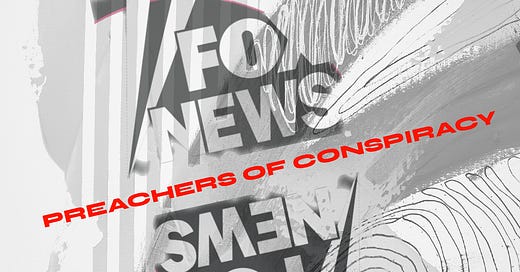Today I published a reflection on conspiracy theory and theology for the Centre for Cultural Witness based in London and affiliated with the Church of England. Give it a read and a share if you find it valuable!
While I was wrapping up the piece though, the news broke about Tucker Carlson’s firing from Fox News.
I’m reading tons of reactions about Tucker Carlson’s firing. And people are right to point out his time on Fox is best described as a platform for conspiracy theory. I’ve largely stayed away from immediate commentary. (Doing the deep work of a PhD is a something of a luxury that way)
Tucker Carlson’s stay at Fox certainly amplified conspiracy theory. And—recalling my days as a pastor in 2020—I’ve come to recognize most of the pushback I received about social justice, applying theology to political decisions, much of it was conditioned by steady doses of Tucker’s rants combined with chapter/verse prooftext. Carlson was as much a pastor to many Americans as any local pulpit in 2020. Carlson packaged conspiracy theory, paranoia, and fear as “courage and truth” — a really good point from Benjamin Cremer.
That being said: I don’t think taking Carlson off the Fox News train is a “victory for democracy” or for “truth”. That’s because Carlson, as loud as he was, was little more than our own reflection. He played a character. If you need further evidence, just compare his scripted show with his texts between colleagues revealed as part of the Fox v. Dominion lawsuit. “I hate him passionately” Carlson said of Trump.
The truth is: white America created Tucker Carlson. He became latest embodiment of a historical paranoia, resentment, and anxiety. It might be an uncomfortable truth, but some pulpits in America in the early 20th century sound eerily similar to Carlon’s rants. Billy Sunday preached, “they call us (America) the melting pot, so it’s up to us to melt the slag off whatever won’t fit into Americanism and throw it into hell.”
Tucker’s persona was his fate. He became just the latest mouthpiece justifying rage and resentment. His on air persona, that paranoid existence trapped in the void between celebrity and personality, avatar and human, is characteristic of our cultural sickness, not it’s cause. This isn’t to absolve Carlson, but it is to surface the question of what his firing really does in terms of the deep roots of conspiracy theory and theology in American life.
One of the most difficult and rewarding parts of my work right now is learning to talk at the intersection of theology and conspiracy theory. And Tucker Carlson is just one drop of water in an ocean.
Because conspiracy theory is trending in the cultural lexicon, because it is novel in relationship to digital media, and because it is a crisis related to the stability of social and political orders — much of efforts to address it are reactionary. Reactions always emerge from our assumptions, rather than from considering them. All that to say: there are more problems bound up at the intersection of conspiracism and Christians in America than one man’s voice can account for.
Carlon’s firing won’t alter the conditions that fuel conspiracism. It won’t displace “do your own research” and the rabbit holes of algorithms as a survival strategy for this brave new world. It’ll shake up the pursuit of the bottom line of cable news—paranoia is profitable after all. But it’s not going to do the deep work that the crisis calls for.



